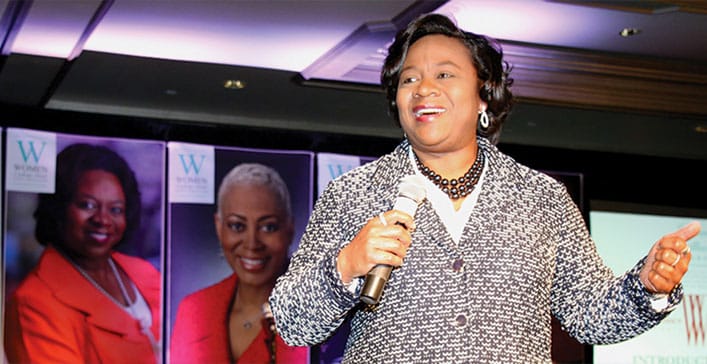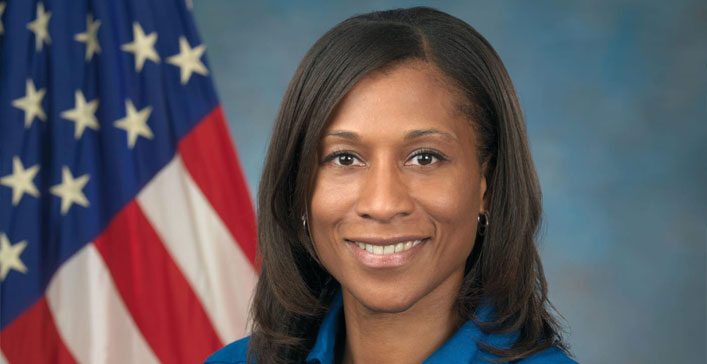The Executive Escalation of PepsiCo’s Benita Chinn
Atap on the shoulder, they call it.
Benita Chinn is just over a year into her role as Senior Director of Manufacturing Capability and Systems for PepsiCo North American Beverages. Using cutting-edge tools and technology, she leads a national team that’s making manufacturing “fun” again, while advancing the company’s bottom line and moving into a digital space.
Benita has spent more than two decades rising through the ranks at PepsiCo, one of the most lucrative corporations in the world. Her 25-year tenure spans six states and eight board of director appointments. She was the first female plant director for Gatorade, based in Atlanta, and she’s been a leader in six different PepsiCo business units, working on some of the world’s most powerful brands, including Captain Crunch, Rice-A-Roni, Pepsi and Tropicana.
Her prestigious career burgeoned from humble beginnings. Born in Suffolk, Virginia, Benita is the youngest of two daughters to James and Bettie Smith. A town of less than 100,000 residents, Suffolk bristles with the beauty and bucolic charm of a picturesque community.
Benita’s childhood was corralled with accolades, to the amazement of many around her. “Is there anything she’s not good at?” some would ask. To that, Benita would reply, with a glistening smile, “I can’t swim.”
As a high school freshman, she was awarded first chair trombone in the band, starting point guard on the girls’ basketball team and starting outfielder for the softball team — all while conquering her studies as an honor roll student.
By her last year of high school, she was an all-district point guard, all-region band selection, top seed on the girls’ tennis team and picked for Virginia’s Governor School for the Gifted and Talented.
“My sister, Sherry, had a master’s degree in computer science from John’s Hopkins University and worked for the Department of Defense as a systems engineer,” Benita says. “I admired her success and her ability to succeed in a male dominant environment. I knew I would lean on her experience once I started my professional career.”
The seeds of Benita’s corporate career were planted before she graduated from high school. A guidance counselor submitted her application for a junior engineering apprenticeship at the Naval Air Rework Facility on the Norfolk Naval Base. She was one of only two students selected in the entire Hampton Roads, Virginia area.
Benita started her apprenticeship the week after walking the stage at graduation. At the time, she didn’t have her own transportation so her father arranged for her to carpool each day with some other employees to the naval base.
They were welders, pipefitters, electricians, mechanics — all men. Much like Benita’s father, a welder for Newport News Shipbuilding refurbishing aircraft carriers, they dressed in heavy work clothes, bandanas and steel-toe boots.
Benita, however, donned blouses and khakis for the engineering office.
“[I] worried about getting grease on the new clothes my mom bought for me,” Benita says with a laugh.
At just 17, Benita spent her days refurbishing A-6 and F-14 fighter jets. She edited jet wing engineering drawings and tested electrical components in the hangars.
When the summer ended, Benita decided to attend Virginia Tech’s engineering and technology program. She was awarded a scholarship to play for their women’s basketball team.
“I had basketball dreams and corporate dreams, never for once doubting I could achieve both,” Benita says.
After four years playing for the Hokies, it became clear to her that those hoop dreams would not materialize. As her dreams of championships and All-American honors faded, her corporate dreams lay before her like a red carpet. With the naval base engineering apprenticeship already on her college resume, another corporate door opened for her in a place she least expected.
During Benita’s senior year of college, she went home to Suffolk for Christmas. Her mother had worked for GE as a technician manufacturing televisions, and repairing the televisions in their home. Benita’s mom had just started a new job at Hills Bros. Coffee as a machine operator, filling flexible packaging and cans with coffee, and was preparing to attend the annual Christmas party.
“My father, shy amongst strangers, didn’t want to attend,” Benita says. “I agreed to be my mother’s date.”
At the party, Benita’s mother introduced her to Charlie Cortelini, the plant director for Hills Bros. They talked about her studies, the engineering apprenticeship and her love for basketball. “It was my first informal interview,” Benita says with a smile.
She was hired the following summer as an engineering co-op for the coffee company’s new startup facility. She worked hand-in-hand with corporate engineers on new operations and edited engineering drawings. Once again, she was the only woman in the room.
After six months with Hills Bros., Benita returned to Virginia Tech to complete a student teaching assignment. Before graduation, she was offered a position as a junior project engineer with Hills Bros., which at the time was a brand of Nestlé USA.
After graduating with her bachelor’s in engineering and technology education, Benita began a four-year career with Nestle. It was a time of professional and personal growth, she says, navigating a world dominated by men.
During her first six months on the job, Benita was a maintenance supervisor, in charge of men who were old enough to be her father. To strengthen her skills, she came in some weekends and helped the maintenance techs complete tasks, which was uncommon for most supervisors.
She traded the blouses for a pair of coveralls, rolling up her sleeves to take on some of the “less palatable tasks.”
“I was told the guys were not sure of me at first, but I proved myself to them,” Benita declares.
At 25, Benita’s college and professional resume was beginning to look more like that of a 15-year veteran in management. The four years she spent at Nestlé afforded her a number of leadership roles.
Then in October 1995, Benita made a decision that surprised even her. She accepted a position as a process improvement engineer for Quaker Oats in Cedar Rapids, Iowa. It was the beginning of a 25-year legacy with Quaker Oats and Pepsico, who merged in 2001.
When she started, Benita managed the operating budget for Quaker Oats’ ready-to-eat cereals. She was eventually promoted and moved to Chicago, where she led a team in the consolidation of two pasta plants.
While in Chicago, she received her MBA from the University of Chicago and was later promoted to Gatorade senior operations manager. Her hard work earned her the prestigious Supply Chain Leadership Award.
Benita’s determination and leadership continued with her position as Gatorade plant director for the Oakland, California, facility in 2009. Under her leadership, the facility went from worst to top performer in less than six months. She earned the Founder’s Award for the No. 1 Gatorade facility in North America the following year.
But the challenges of success were no preparation for what life handed her next. In 2011, Benita found herself in the waiting room of a hospital, waiting for what seemed to be another routine heart surgery for her husband to be completed. When the doctor returned, this time he was with a chaplain, asking if there was someone she could call to be with her.
She was all alone. Benita’s husband, Eric, died of heart failure, 10 years after his diagnosis of heart disease. After almost 14 years of marriage, she was suddenly a widow and single mother to her 7-year-old son, Bryce.
“I had done many things alone in my life, but nothing like this,” Benita says. “I had even persevered through the loss of a child, but Eric was there with me. Nothing compared to the loss of a spouse, a best friend and the father of my son.”
Thankfully, Benita was not alone. A loving support system embraced her, fondly calling themselves “Team Chinn.” Friends kept Bryce while Benita attended early morning meetings or traveled on business, often flying her parents in for one-to-two week stays so she could focus on work.
“I had to try and get over the agony of asking for help,” Benita says. “I accepted that I could no longer do everything alone.”
Eric’s passing forced Benita to tap back into her athletic skills. Like his mother, Bryce had an affinity for basketball. Eric had coached Bryce’s kindergarten team and made Benita promise she would continue in his place.
Benita has kept that promise to this day. She’s a coach for Bryce’s 9th grade AAU team and even taught him some football moves. But Benita also prioritizes tackling the books. She creates practice math, science and language tests for Bryce, and smothers him in life lessons.
“I can only hope that I am providing a foundation of knowledge that he can leverage in his life,” Benita says. “Being the coach, teacher, cook, disciplinarian, bread-winner and mom is a lot for one person. I realized and accepted that I needed help and still do.”
In many ways, Benita’s journey is an unconventional one, filled with the kind of success that is not often experienced by women of color leading in technical roles. She hopes more women will be empowered to fight for what they are worth.
“Being bold, confident and recognizing our value and worth is important to be successful,” Benita says. “Everyone needs a godfather throughout their career. Someone to give you unbiased advice and coaching, but has a seat at the table to sponsor and support you.”
Benita credits her mentors at PepsiCo for teaching her to be bold and recognize her own worth. But it’s her tenacity, brilliance and confidence that sustains her, and puts her in a seat of power and influence at the company. As an athlete, mother, teacher, motivator and one of PepsiCo’s strongest executives, Benita is conquering the status quo of women and people of color.
Benita jokes for all her achievements, she still can’t swim. But she made sure Bryce became an excellent swimmer.






